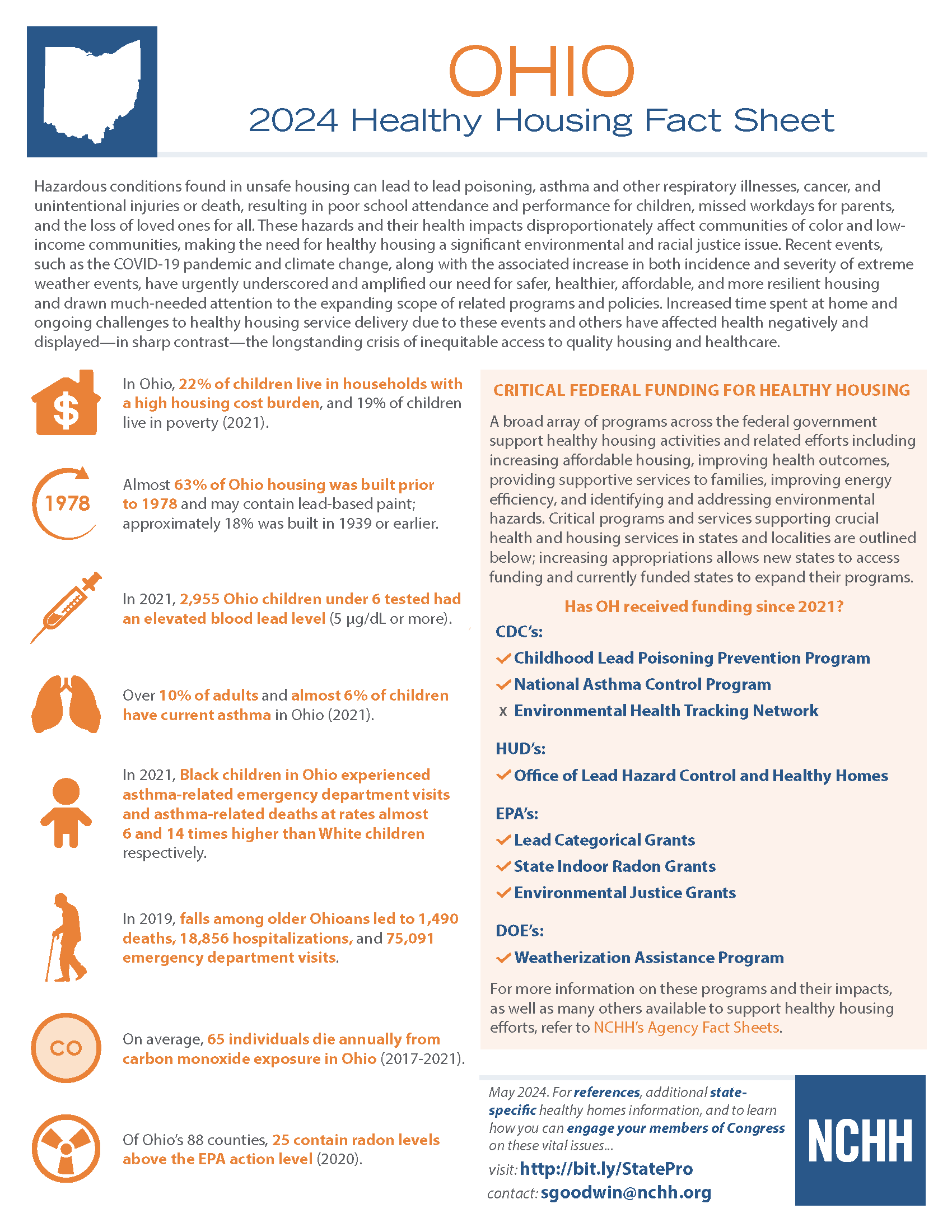Healthy Housing in Ohio
The healthy housing needs of each state are unique and varied. Taking time to learn more about your local landscape and the data, stakeholders, resources, and policies that may exist or be available to you can only serve to enhance your efforts, regardless of whether you’re just starting out or if you’re a well-established leader. Collected below are a few suggested ways to learn more about what’s going on in your state. Additionally, consider exploring some of NCHH’s other state-specific resources such as the Case Studies and Model Policies section or the other state webpages to learn more about efforts taking place elsewhere across the country, potential opportunities for regional collaboration, and perhaps even check out how your state compares.
Get the Facts
NCHH has created healthy housing profiles for each of our 50 states, five U.S. territories, and the District of Columbia for use by policymakers and advocates across the country. Each fact sheet offers eight statistics about the state-specific healthy housing situation and provides information as to which of eight programs at CDC, HUD, and EPA are currently funding your state efforts. Most information was found from federal or state governments, and each fact is hyperlinked to the source material. Click on the image to the right or browse through all of the fact sheets here.
Find Local Data
Local-level data, combined with complementary federal sources, provide the most robust health and housing assessment to drive healthy housing baseline data. From this baseline data, actors in many communities have designed and targeted healthy housing programs and resources, and developed dashboards for measuring progress. Find resources here to help to address these challenges.
Compare Your Codes
NCHH has developed an online tool that will enable communities to compare their current housing/property maintenance code to the National Healthy Housing Standard (NHHS) and the International Property Maintenance Code (IPMC).
This robust online application allows communities to conduct a self-review of their code (with limited technical assistance from NCHH) and may be used by staff of organizations (such as local health departments, local housing agencies, housing-based nonprofits, neighborhood associations, universities, or other similar groups) seeking to improve the health of their communities. Learn more about NCHH’s Code Comparison Tool.
Discover New Partners
Developing strong coalitions, partnerships, or alliances can feel time consuming but can be beneficial in amplifying your efforts and ensure long-term action in your community. Because every state has its own unique landscape, the partners and resources you choose to work with will vary. It’s important to consider partners from a range of sectors (such as public health, healthcare, housing, energy, and the environment) and variety of backgrounds (such as federal, state, and local government agencies, nonprofit organizations, professional associations, community action agencies, health insurance payers, and more).
Use our Discover New Partners page to find groups, organizations, and agencies that may already be working on healthy homes issues in your state or be mission-aligned to explore opportunities to move into this type of work with you. Also available are agency/organizational lists and member directories that may help you to locate potential partners, learn more about the healthy homes activities and funding that may already exist in your community, and other resources.
Engage Your Elected Officials
Ohio’s delegation to the U.S. Congress includes two senators and 16 representatives. Its state legislature includes 33 senators and 99 representatives. For information about how to contact your members of Congress, how to prepare for meetings, and how to advocate effectively, visit our Meet Your Member of Congress page.
Publications and Projects
Use our quick search feature to find case studies, fact sheets, research projects and reports, and other resources that NCHH has produced or compiled that are related to your state.
COMING SOON.
Latest page update: July 29, 2024.

